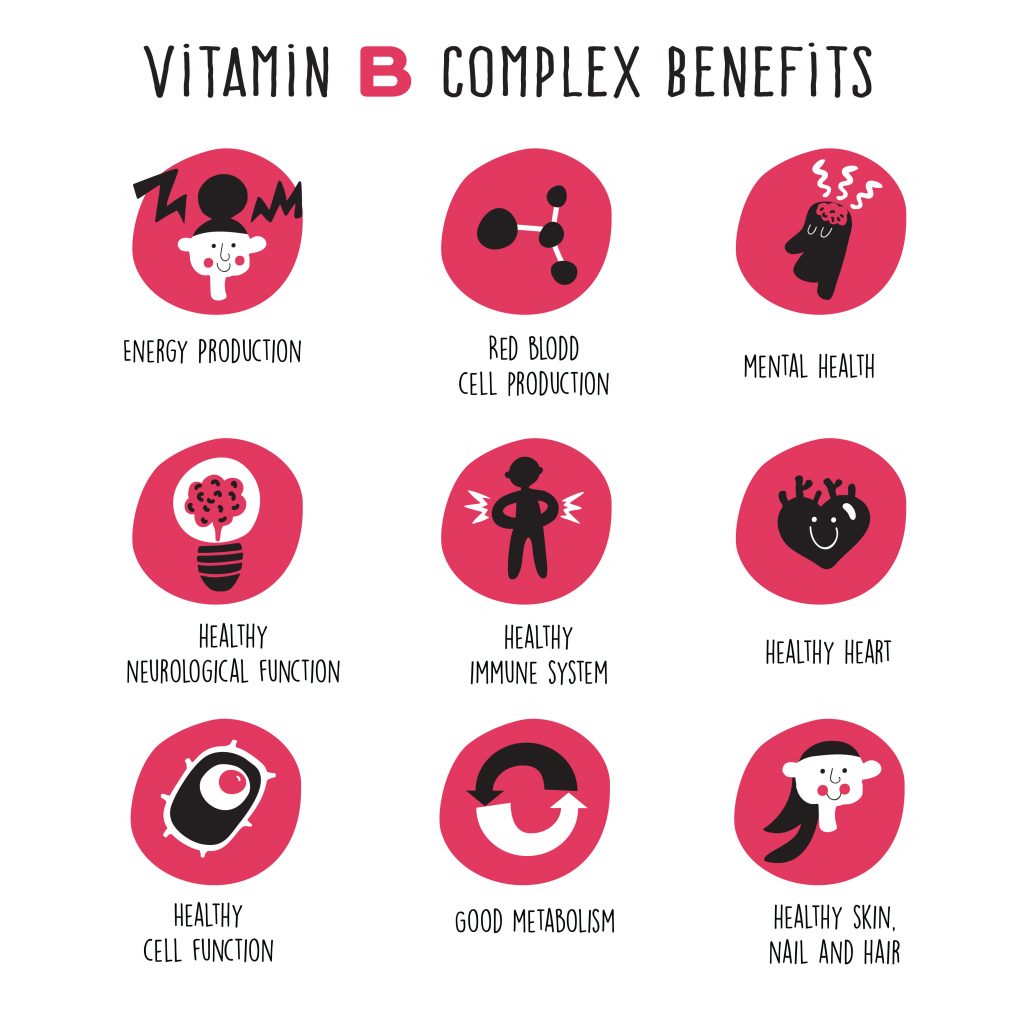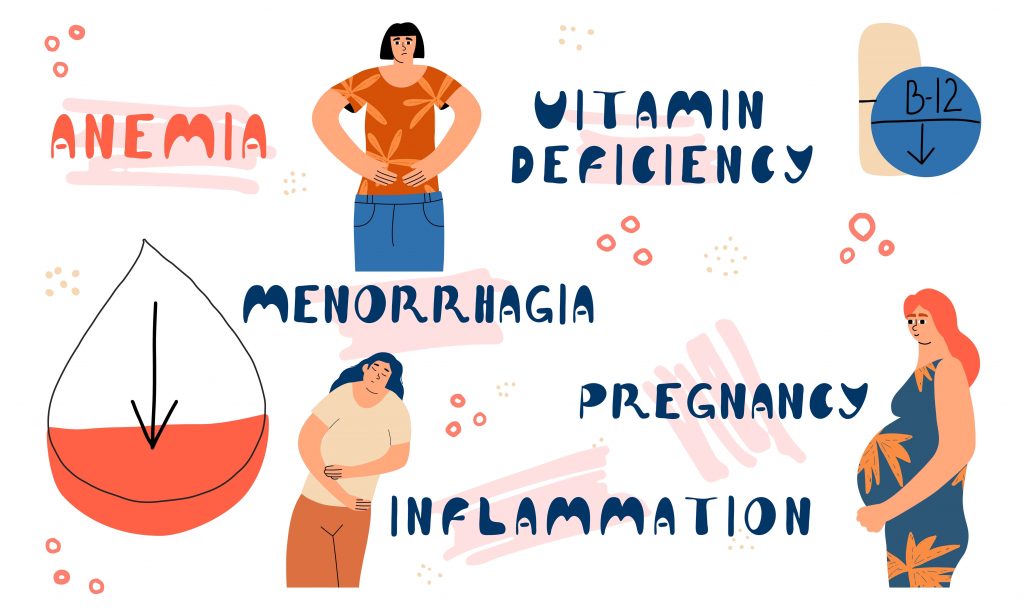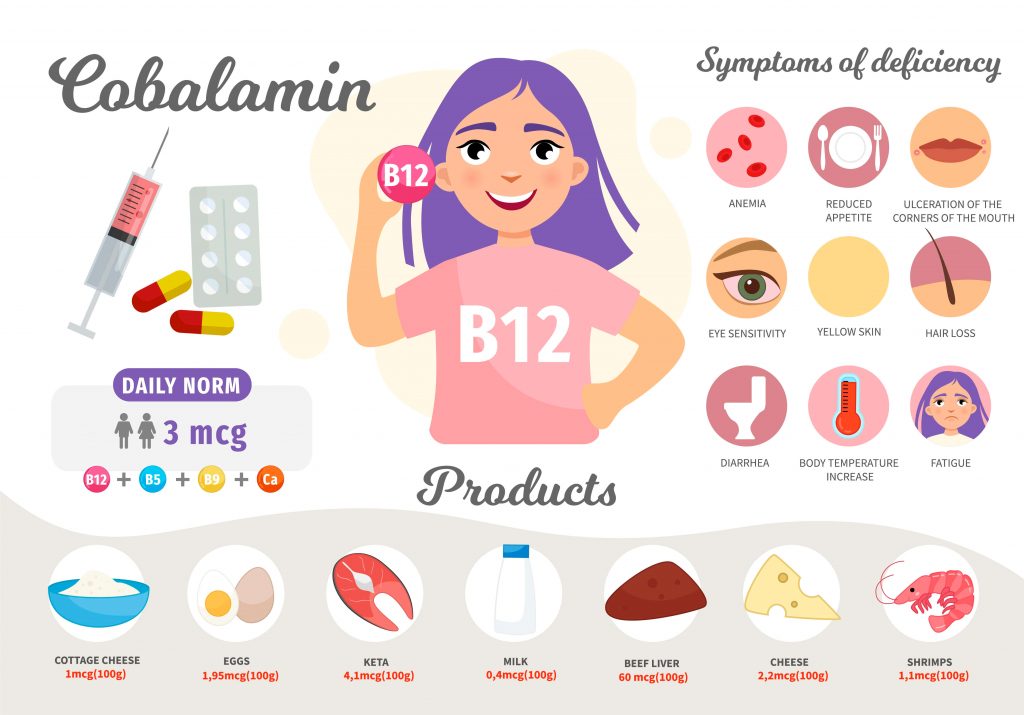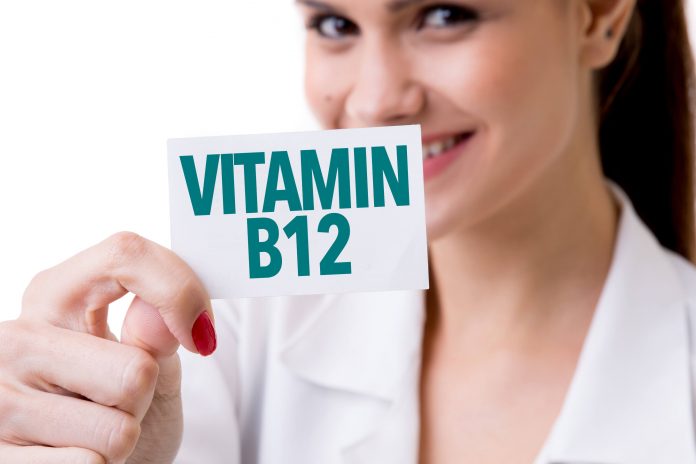Vitamin B12, also known as cobalamin, is an essential vitamin that your body needs but cannot produce.
It is, however, found naturally in many animal products. But also added to certain foods and available as an oral supplement or injection
Vitamin B12 is the largest and most structurally complicated vitamin. It occurs naturally in animal products like meat and eggs, and manufacturers can produce it through bacterial fermentation synthesis.
Like all other B vitamins, Vitamin B12 is a water-soluble vitamin. This means it can dissolve in water and travel through the bloodstream. The body can store vitamin B12 for up to 4 years, and it can get rid of any excess or unwanted vitamin B12 in the urine.
Vitamin B12 is essential for healthy blood. When the body does not have enough B12, it leads to decreased normal red blood cell production (anemia), which impairs oxygen delivery.
Vitamin B12 is crucial to various bodily processes, including –
- Health and normal functioning of the brain and nervous system –
Vitamin B12 deficiency has been associated with memory loss, especially in older adults.
A study found that even vitamin B12 levels on the low side of normal can contribute to poor memory performance.
- Cognitive functioning (ability to think)
- Formation of red blood cells and anemia prevention – vitamin b12 plays a vital role in helping your body produce red blood cells. Low vitamin b12 levels cause a reduction in red blood cell formation and prevent them from developing properly
- Helping create and regulate dna – vitamin b12 is important for dna synthesis and ensures structural stability of important regions of the chromosomes.
- Possibly preventing congenital abnormalities – adequate vitamin b12 levels are crucial to a healthy pregnancy.
Studies show that a fetus’s brain and nervous system require sufficient B12 levels from the mother to develop properly. Females with vitamin B12 levels lower than 250 milligrams per deciliter (mg/dL) are three times more likely to give birth to a child with birth defects, such as neural tube defects. Furthermore, maternal vitamin B12 deficiency may contribute to premature birth or miscarriage.
- Helping protect the eyes from macular degeneration – Maintaining adequate levels of vitamin B12 decreases homocysteine levels in your blood. This may help prevent the development of age-related macular degeneration.
- May improve mood and symptoms of depression
Vitamin B12 may improve your mood.
The effect of vitamin B12 on mood is not yet fully understood. However, this vitamin plays a vital role in synthesizing and metabolizing serotonin, a chemical responsible for regulating mood
- May improve heart health by decreasing homocysteine
High blood levels of the amino acid homocysteine have been linked to an increased risk of heart disease
Studies have shown that vitamin B12 helps decrease homocysteine levels, which may reduce your risk of heart disease
- Necessary for energy production – Vitamin B12 supplements have long been thought of as the go-to product for a surge of energy.
Vitamin B12 is involved in energy production in your body. Taking a supplement may improve your energy level, but only if you’re deficient in this vitamin.
All B vitamins play an important role in your body’s energy production, though they don’t necessarily provide energy themselves
- Supports healthy hair, skin, and nails
Given vitamin B12’s role in cell production, adequate levels of this vitamin are needed to promote healthy hair, skin, and nails
- May support bone health and prevent osteoporosis
Maintaining adequate vitamin B12 levels may support your bone health. studies have shown a link between low vitamin B12 levels and poor bone health and osteoporosis or fracture risk.

One study in 110 people with celiac disease found that low levels of vitamin B12 were linked to decreased bone mineral density in the femur and hips in males.
Normal Requirement:
The National Institutes of Health (NIH) recommend that teens and adults over the age of 14 should consume 2.4 micrograms (mcg) of vitamin B12 daily. Pregnant people should consume 2.6 mcg, and lactating people 2.8 mcg.
Who is at risk of vitamin B12 deficiency?
Even though vitamin B12 is found in a variety of foods, some people are at an increased risk of developing B12 deficiency or insufficiency. Groups at an increased risk include:
- a vegetarian or vegan
- age 60 or over
- people taking acid-suppressing drugs
- people on metformin for diabetes
- those suffering a chronic digestive disorder such as Crohn’s, celiac disease, or irritable bowel syndrome
- people with an eating disorder
- those who have had weight loss surgery
- people having H. pylori, the bacteria that causes ulcers
- people who take excessive alcohol or nitrous oxide
- HIV-positive patients
A deficiency or insufficiency can occur when levels of vitamin B12 become too low to meet the demands of the body. This happens if a person does not consume enough of the vitamin in their diet or if their body cannot absorb it effectively during digestion; it can lead to a number of symptoms and can even progress to irreversible neurological issues if left untreated.
Approximately 6% of adults aged 60 or younger have vitamin B12 deficiency. The rate jumps to 20% in people older than 60.

Some possible causes of vitamin B12 deficiency:
- Pernicious anemia
An autoimmune disease that affects the gut’s ability to digest vitamin B12.
The immune system creates antibodies that attack and damage cells that produce intrinsic factor, without which the intestines will be unable to absorb vitamin B12.
- Bowel problems
Conditions that affect the stomach or small intestine, such as Crohn’s disease, celiac disease,
Surgery can result in malnutrition because the patients cannot absorb enough vitamins, water, and other nutrients.
- Diet
People who follow a vegan or vegetarian diet may have a higher risk of B12 deficiency.
Unless a vegan diet is carefully planned, it is difficult to get enough vitamin B12 through plant foods alone. While some plant foods contain vitamin B12, it is often in a form that the body cannot absorb efficiently.
- Medications
Some medications such as antacids can affect the body’s ability to digest vitamin B12, leading to a deficiency.
PPIs prevent the stomach from producing acid, but the body needs acid to absorb vitamin B12.
- Alcohol
People with chronic alcohol use disorder may lack vitamin B12, as their bodies may not absorb nutrients efficiently.
- Functional vitamin B12 deficiency
Some people appear to have enough vitamin B12 in their blood, but they do not have the proteins they need to transport it between cells. This means the body cannot use it effectively.
Symptoms may include:
- Anemia – The most common symptoms of anemia are fatigue, shortness of breath, and an irregular heartbeat.
Pale or yellow skin – The hallmark symptom of B12 deficiency is megaloblastic anemia, in which the red blood cells are immature and larger than usual. This affects their ability to deliver oxygen effectively to the body.
Like the condition called iron deficiency anemia, anemia related to B12 deficiency may make your skin pale due to a lack of fully-matured, healthy red blood cells in the body
B12 deficiency can also cause a condition called jaundice, which makes your skin and the whites of your eyes take on a yellowish color due to high levels of bilirubin (2Trusted Source).
- Nerve damage – Many adults and kids who have B12 deficiency report experiencing paresthesia, a burning or pins-and-needles sensation in certain areas of the body like the hands and feet, due to damage to nerves; it also negatively impacts motor and sensory nerve function, which can cause muscle cramps and weakness
- Damage to the spinal cord
- Neurological problems that affect mental health – Many studies have associated low B12 levels with worsened mental function in older adults.
- Cardiovascular disease
- Depression – Having low levels of B12 can cause elevated levels of a sulfur-containing amino acid called homocysteine. In turn, this may contribute to the development of depression by increasing oxidative stress, DNA damage, and cell death in the body
- Confusion – Because a deficiency in B12 negatively impacts the central nervous system, people with low or deficient B12 levels may feel foggy-headed and have difficulty concentrating and completing tasks
- Memory problems
- Headaches – Headaches are among the most commonly reported symptoms related to B12 deficiency in both adults and kids. Studies people,half of whom experienced migraine, found that blood levels of B12 were significantly lower in the participants with migraine.
- Fatigue and weakness – Your body’s cells need B12 to function properly. As such, having inadequate B12 levels can decrease normal red blood cell production, which can impair oxygen delivery, leaving you fatigued.
- GIT issues – A B12 deficiency may also cause diarrhea, nausea, constipation, bloating, gas, and other gastrointestinal symptoms
- Problems with balance – Ataxia, or impaired balance and coordination, is a neurological symptom that can be caused by B12 deficiency. As such, a person with B12 deficiency may have difficulty walking and balancing
- A sore mouth or tongue – Glossitis is a medical term that refers to an inflamed, red, and painful tongue. It can be caused by a B12 deficiency.
- Erectile dysfunction: Men with B12 deficiency may experience erectile dysfunction as a result of increased levels of homocysteine in the body
- Vision disturbances: B12 deficiency may cause vision disturbances, possibly due to damage to the optic nerve.

Infants who lack vitamin B12 may show:
- unusual movements, such as face tremors
- reflex problems
- feeding difficulties
- irritation
- megaloblastic anemia
- Anemia and neurological problems can lead to further symptoms and complications.
- eventual growth problems if left untreated
Safety and side effects
When taken at appropriate doses, vitamin B-12 supplements are generally considered safe. While the recommended daily amount of vitamin B-12 for adults is 2.4 micrograms, higher doses have been found to be safe. Your body absorbs only as much as it needs, and any excess passes through your urine.
Side effects:
High doses of vitamin B-12, such as those used to treat a deficiency, might cause:
- Headache
- Nausea and vomiting
- Diarrhea
- Fatigue or weakness
- Tingling sensation in hands and feet.
What are the best sources of vitamin B12?

Foods high in vitamin B12 include:
- MEATS:
Organ meats are some of the most nutrient-packed foods. Liver and kidneys, especially from lamb, are rich in vitamin B12.
- Beef
Beef is an excellent source of vitamin B12. If you’re looking for higher concentrations of vitamin B12, it’s recommended to choose low fat cuts of meat. It’s also better to grill or roast it — instead of frying — to preserve the B12 content.
- Pork
- Ham
- Poultry
- Lamb
- SEAFOOD:
- Clams and mollusks:
Clams are small, chewy shellfish that are packed with nutrients. This mollusk is a lean source of protein and contains very high concentrations of vitamin B12.
- Tuna
Tuna is a commonly consumed fish and a great source of nutrients. It contains high concentrations of vitamin B12, especially in the muscles right beneath the skin, which are known as dark muscles
- Trout
Rainbow trout is considered one of the healthiest fish. This freshwater species is a great source of protein, healthy fats, and B vitamins.
- Salmon
Salmon is well known for having one of the highest concentrations of omega-3 fatty acids. It’s also an excellent source of B vitamins.
- MILK AND DAIRY PRODUCTS
Milk and other dairy products, such as yogurt and cheese, are great sources of protein and several vitamins and minerals, including vitamin B12. Full-fat plain yogurt may also be a decent source. It has even been shown to help improve vitamin B12 status in people who are deficient in this vitamin
- FORTIFIED NONDAIRY MILK
Nondairy milk is popular among those who want a nutritious vegan replacement for dairy milk.
While soy, almond, and rice milks are not naturally high in vitamin B12, they are usually fortified, which makes them an excellent source of this vitamin.
- SOME NUTRITIONAL YEAST PRODUCTS
Nutritional yeast is a good vegan source of protein, vitamins, and minerals. It’s a species of yeast specifically grown to be used as food, not as a leavening agent in bread and beer.
It does not naturally contain vitamin B12. However, it’s commonly fortified, which makes it a great source of this nutrient.
- EGGS
Eggs are a great source of complete protein and B vitamins, especially B2 and B12.
Research has shown that egg yolks have higher levels of vitamin B12 than egg whites. The B12 in egg yolks is also easier to absorb. Therefore, it’s recommended to eat whole eggs instead of just their whites
- FORTIFIED CEREAL
This source of vitamin B12 may work well for vegetarians and vegans because it’s synthetically made and not derived from animal sources
Additionally, manufacturers fortify some types of plant milk and breakfast cereals with vitamin B12.
People can take B12 supplements orally or in a nasal spray. However, oral supplements may not in many cases of deficiency. In these circumstances, a doctor may recommend vitamin B12 injections.








